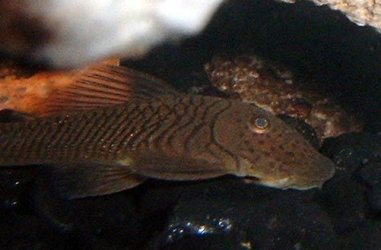Auratus
Why am I browsing a fish forum at 2am?
Common name: Rubbernose Pleco / Bulldog Pleco / Rubberlip Pleco
Scientific name: Chaetostoma milesi
Family: Loricariidae
Origin: Columbia
Maximum size: Average size of 3 inches but can grow up to 6.
Care: Needs a minimum tanksize of 10 gallons, prefferably bigger. Keep the temperature from 75 to 80f. Likes to hide in caves and under rocks. Prefers smooth stones and large rounded gravel. Very timid and only comes out at night or when no one is in the room. Very nice fish but you'll only see them like once every week or so. Keep with peaceful community fish.
Feeding: Algae wafers and veggies like cucumber, lettuce, and squash, some live or frozen foods.
Sexing: Males have a longer dorsal fin then females and the striped pattern is more noticable.
Breeding: Unknown

Scientific name: Chaetostoma milesi
Family: Loricariidae
Origin: Columbia
Maximum size: Average size of 3 inches but can grow up to 6.
Care: Needs a minimum tanksize of 10 gallons, prefferably bigger. Keep the temperature from 75 to 80f. Likes to hide in caves and under rocks. Prefers smooth stones and large rounded gravel. Very timid and only comes out at night or when no one is in the room. Very nice fish but you'll only see them like once every week or so. Keep with peaceful community fish.
Feeding: Algae wafers and veggies like cucumber, lettuce, and squash, some live or frozen foods.
Sexing: Males have a longer dorsal fin then females and the striped pattern is more noticable.
Breeding: Unknown




 /www.planetcatfish.com/catelog/speci...?species_id=407
/www.planetcatfish.com/catelog/speci...?species_id=407